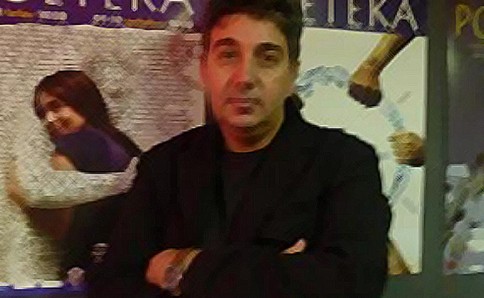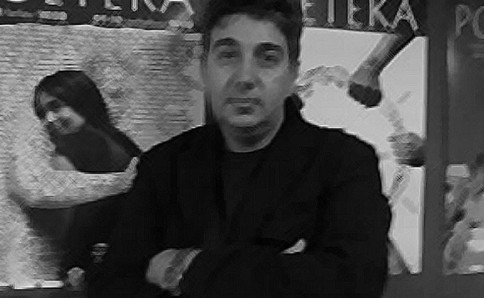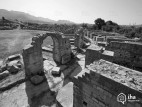poetry
Arian Leka: Poems
Arian Leka (1966) belongs to the group of authors, which have come to the forefront after the opening of the Albanian borders and are considered to be avant-garde. By origin from the port city of Durres, this author, except modernity, weaves a whole mythology around his homeland, making the principle maritime symbols regards in his work as a poet, short story writer, novelist and essayist too, and transforms also them in a new living aesthetic and urban language, signing the multicultural life of this city. He studied music at the Jan Kukuzeli’s Music Academy. He is the author of 15 books.
For his creativity work Arian Leka received numerous literary awards for his poetry in his country and abroad.
Autumn in Durrës
The September wind
Has thrust its arrows into the trees,
Freezing the blood of the foliage,
And this is a sign
For the fruit that they must die in their sleep.
No one drowns in the sea but the Çamian widows
Who wash their bloomers in autumn's sorrows.
The waters must be fed on sifting sand and the rust of ships
By the one brought to the plains by last year's wind
Like the feathered bed of a beloved corpse
Where no one comes to sleep anymore,
Not even the waves madly chanting in their low roar.
I cover myself in leaves as I painfully bury with bird feathers,
Azure sea lilies and seaweed,
The Çamian widows unwinding their white braids over a well.
The Spine of the Sea
My people turned their spines to the sea.
And I have the same inclination,
I sink ships,
Bore holes in their sides
And flee afar
To where clouds seem like fish,
Every grave is a barge with a white sail,
Where every tree grows fruit in its belly,
And the ships...
The ships depart
Because my people turned their spines to the sea
And reaped
But the sweet food of the land
And the drink.
Alone
Profound is solitude in two glasses of wine,
A ruddy horse and a white horse.
Nothing is as it seems to be
When you have it all and no one to share it with.
Soon it will rain and the doors will be shut,
Those inside are in, no others will make it,
Two glasses of wine, a black horse in the jug,
I now have it all, but no one to share it with.
More Than the Moon
You ask for no more than the moon
As you rest your head in the dusk
And enter the window
To me
You come shrouded in white clouds,
Scarves like wings, parted your lips
A little,
Not with words
But with a fragrance that reminds me
Of the lilacs
That morning which our eyes devoured,
Thus I cannot sleep
In this lifeless bower
Where the covers go berserk, are swollen
Without you.
Postcard
I placed my finger on your name
And feel the pain,
Memory has claws,
Makes noise
On the beach where we kissed with our feet
The flowers that did not blossom that winter without you,
The flame that we devoured till our teeth melted.
The rivers are leaving to confess for me in the sea
For it is mass,
It was a Sunday, that day
When I placed my finger on your name.
My finger, Its nails cut.
Judaic
You threw your white clothes into the air
For the sky was bereft of its clouds,
For the apples were sour and I was alone
When the signs said: rise,
Move, and you did not understand
That a new season, a new age was dawning,
When something was wriggling in your being
And you had a lust and desire
To betray:
Your eyes,
your wife,
Yourself,
your sons,
Your friends
your life
For another,
Since a day will come with an empty soul
When you are left with a desire
To betray:
Yourself,
Life given as alms.
Easter on the Island of Hvar
The sea eats stone eggs
And breaks its teeth on the banks:
Salty islands, poison cactus,
Rosemary and the oils of lamps
That departed to return no more,
Brides kidnapped by the wind,
Maidens bitten by pirates.
My soul walks over these waters
That saw me in an Easter dream.
Six bell towers - halleluiah!
The sea breaks stone eggs - ouch!
I break a milk tooth
On a glass of dry wine.
Six o'clock. Humanity at church. The sea and me outside.
Background Chant
How can you sing over a grave,
Oh cuckoo,
Where the earth thrusts cypress trees
Like knives into its sides and flanks,
Where the sky dies insane
Of an overdose of solitude?
Could you not,
Could you not,
Little bird,
Have revived with your song
One single man?
Translated from the Albanian by Robert Elsie
THE LITTLE SHOE WITH THE STUCK STONE
Whatever has happened to my homeland
to me has happened too.
In the eyes of orphan old men
like mucus are stuck
a few mountains, named plains,
and a blue briny desolation,
where I hunt with a hook birds
that peck the brain barrels,
and wherein we pickle the Gods,
whose time to revive has not yet come,
neither the day of worship,
nor the hour, Albanian
to speak.
Homeland – mother’s gift upon birth.
But today,
my country’s apples
are a bunch full of crap.
My country,
my homeland so puny as the pupil
that contrives hoary inventions,
and gets you grey, and makes you bald
and that shares with children the love
scattered like crumbs on the ground,
in the dark.
Homeland is remains,
the only remains that smell of perfume.
Sleeping Illyria…[1]
Feeble Arberia…
The corpse we inter day to day in the heart,
in stomach, under tongue and deep in the pocket,
and anoint it with tea, bay leaf and resin,
that name
that begs for nothing but only gives.
Gives.
CANTICLE FACE
rondo
God who takes and God who gives
Is the finger
Of God who unbraids and God who weaves
Is the hand
Of God who slays and God who forgives
Is the foot
Of God who waits and God who leaves
Are the same
Just the same
As God who speaks and the dumb God
As the blind God, or God who keeps guard
For the perfect God and He who gives me a prod
Is the heart
Of God who scorns and He who enthuses
Of God of Art and Him without Muses
Is the eye
Of God from the Sky who enters through a door
And the mind
Of Field God who leaves room for others no more
Are the same
As well
As God who appeared and He who was never seen
As the praised God and Him full of sin
As God with an altar and He who is mean
Is the ear
Of God with a son and Him without one
And the mouth
Of God who came on ass and Him who fought on a stallion
Are the same
All the same
They just go to point out
That blind faith is but doubt
Without ear
And finger
Or mouth.
[1] Illyria is the ancient name of the country inhabited by the eponymous people who are claimed by both Albanians and foreign historians alike to be the predecessors of modern Albanians. Arberia is the medieval ethnonym of Albania.
panorama
Rebecca Duran's Take on Modern Day Life in Pazin (Istria)
Croatia is a small, charming country known today as a prime European tourist destination. However, it has a complicated often turbulent history and is seemingly always destined to be at the crossroads of empires, religions and worldviews, with its current identity and culture incorporating elements from its former Communist, Slavic, Austrian-Hungarian, Catholic, Mediterranean, and European traditions.
review
Review of Dubravka Ugrešić's Age of Skin
Dubravka Ugrešić is one of the most internationally recognizable writers from Croatia, but she has a contentious relationship with her home country, having gone into self-exile in the early 90s. Her recently translated collection of essays, The Age of Skin, touches on topics of of exile and displacement, among others. Read a review of Ugrešić’s latest work of non-fiction, expertly translated by Ellen Elias-Bursac, in the link below .
review
Review of Neva Lukić's Endless Endings
Read a review of Neva Lukić's collection of short stories, Endless Endings, recently translated into English, in World Literature Today.
panorama
A Guide to Zagreb's Street Art
Zagreb has its fair share of graffiti, often startling passersby when it pops up on say a crumbling fortress wall in the historical center of the city. Along with some well-known street murals are the legendary street artists themselves. Check out the article below for a definitive guide to Zagreb's best street art.
panorama
Beloved Croatian Children's Show Professor Balthazar Now Available in English on YouTube
The colorful, eclectic and much beloved Croatian children's cartoon Professor Balthazar was created by Zlatko Grgić and produced from the late 1960s through the 1970s. Now newer generations will be able to enjoy the Professor's magic, whether they speak Croatian or English.
panorama
An English Book on Croatian Football Legend Robert Prosinečki
Robert Prosinečki's long and fabled football career includes winning third place in the 1998 World Cup as part of the Croatian national team, stints in Real Madrid and FC Barcelona as well as managerial roles for the Croatian national team, Red Star Belgrade, the Azerbaijani national team and the Bosnian Hercegovinian national team.
panorama
Jonathan Bousfield on the Seedy Side of the Seaside
From strange tales of mysterious murders to suspected criminals hiding out to scams, duels and gambling, Opatija, a favourite seaside escape for Central Europeans at the turn of the last century, routinely filled Austrian headlines and the public's imagination in the early 20th century.
review
Review of new English translation of Grigor Vitez's AntonTon
Hailed as the father of 20th century Croatian children's literature, Grigor Vitez (1911-1966) is well known and loved in his homeland. With a new English translation of one of his classic tales AntonTon (AntunTun in Croatian), children around the world can now experience the author's delightful depiction of the strong-minded and silly AntonTon. The Grigor Vitez Award is an annual prize given to the best Croatian children's book of the year.
news
The Best of New Eastern European Literature
Have an overabundance of free time, thanks to the pandemic and lockdowns? Yearning to travel but unable to do so safely? Discover the rhythm of life and thought in multiple Eastern European countries through exciting new literature translated into English. From war-torn Ukraine to tales from Gulag inmates to the search for identity by Eastern Europeans driven away from their home countries because of the economic or political situations but still drawn back to their cultural hearths, this list offers many new worlds to explore.
panorama
More Zagreb Street Art
Explore TimeOut's gallery of fascinating and at times thought-provoking art in the great open air gallery of the streets of Zagreb.
panorama
Welcome to Zagreb's Hangover Museum
Partied too hard last night? Drop by Zagreb's Hangover Museum to feel more normal. People share their craziest hangover stories and visitors can even try on beer goggles to experience how the world looks like through drunken eyes.
panorama
Jonathan Bousfield on the Future as Imagined in 1960s Socialist Yugoslavia
How will the futuristic world of 2060 look? How far will technology have advanced, and how will those advancements affect how we live our everyday lives? These are the questions the Zagreb-based magazine Globus asked in a series of articles in 1960, when conceptualizing what advancements society would make 40 years in the future, the then far-off year of 2000. The articles used fantastical predictions about the future to highlight the technological advancements already made by the then socialist Yugoslavia. Take a trip with guide, Jonathan Bousfield, back to the future as envisioned by journalists in 1960s Yugoslavia.
panorama
Untranslatable Croatian Phrases
What’s the best way for an open-minded foreigner to get straight to the heart of another culture and get a feel for what makes people tick? Don’t just sample the local food and drink and see the major sights, perk up your ears and listen. There’s nothing that gives away the local flavor of a culture more than the common phrases people use, especially ones that have no direct translation.
Check out a quirky list of untranslatable Croatian phrases from Croatian cultural guide extraordinaire, Andrea Pisac, in the link below:
panorama
Jonathon Bousfield on the Museum of Broken Relationships
Just got out of a serious relationship and don't know what to do with all those keepsakes and mementos of your former loved one? The very popular and probably most unique museum in Zagreb, the Museum of Broken Relationships, dedicated to preserving keepsakes alongside the diverse stories of relationships gone wrong, will gladly take them. Find out how the museum got started and take an in-depth look at some of its quirkiest pieces in the link below.
panorama
Cool Things To Do in Zagreb
Zagreb is Croatia’s relaxed, charming and pedestrian-friendly capital. Check out Time Out’s definitive Zagreb guide for a diverse set of options of what to explore in the city from unusual museums to legendary flea markets and everything in between.
panorama
Jonathan Bousfield on Diocletian's Legacy in Split
Diocletian’s Palace is the main attraction in Split, the heart and soul of the city. Because of the palace, Split’s city center can be described as a living museum and it draws in the thousands of tourists that visit the city annually. But how much do we really know about the palace’s namesake who built it, the last ruler of a receding empire? Jonathan Bousfield contends that history only gives us a partial answer.
interview
The Poetry of Zagreb
Cities have served as sources of inspiration, frustration, and discovery for millennia. The subject of sonnets, stories, plays, the power centers of entire cultures, hotbeds of innovation, and the cause of wars, cities are mainstays of the present and the future with millions more people flocking to them every year.
Let the poet, Zagreb native Tomica Bajsić, take you on a lyrical tour of the city. Walk the streets conjured by his graceful words and take in the gentle beauty of the Zagreb of his childhood memories and present day observation.
panorama
You Haven't Experienced Zagreb if You Haven't Been to the Dolac Market
Dolac, the main city market, is a Zagreb institution. Selling all the fresh ingredients you need to whip up a fabulous dinner, from fruits and vegetables to fish, meat and homemade cheese and sausages, the sellers come from all over Croatia. Positioned right above the main square, the colorful market is a beacon of a simpler way of life and is just as bustling as it was a century ago.
panorama
Croatian Phrases Translated into English
Do you find phrases and sayings give personality and flair to a language? Have you ever pondered how the culture and history of a place shape the common phrases? Check out some common sayings in Croatian with their literal translations and actual meanings below.
panorama
Discover Croatia's Archaeological Secrets
Discover Croatia’s rich archaeological secrets, from the well known ancient Roman city of Salona near Split or the Neanderthal museum in Krapina to the often overlooked Andautonia Archaeological Park, just outside of Zagreb, which boasts the excavated ruins of a Roman town or the oldest continuously inhabited town in Europe, Vinkovci.
panorama
Croatian Sites on UNESCO World Heritage Tentative List
A little know fact is that Croatia, together with Spain, have the most cultural and historical heritage under the protection of UNESCO, and Croatia has the highest number of UNESCO intangible goods of any European country.
panorama
Croatian National Theatre in Zagreb
The National Theater in Zagreb, Croatia’s capital, is one of those things which always finds its way to every visitor’s busy schedule.
panorama
Zagreb's Street Art
So you're visiting Zagreb and are curious about it's underground art scene? Check out this guide to Zagreb's street art and explore all the best graffiti artists' work for yourself on your next walk through the city.
panorama
Zagreb Festivals and Cultural Events
Numerous festivals, shows and exhibitions are held annually in Zagreb. Search our what's on guide to arts & entertainment.












































.jpg)
.jpg)




